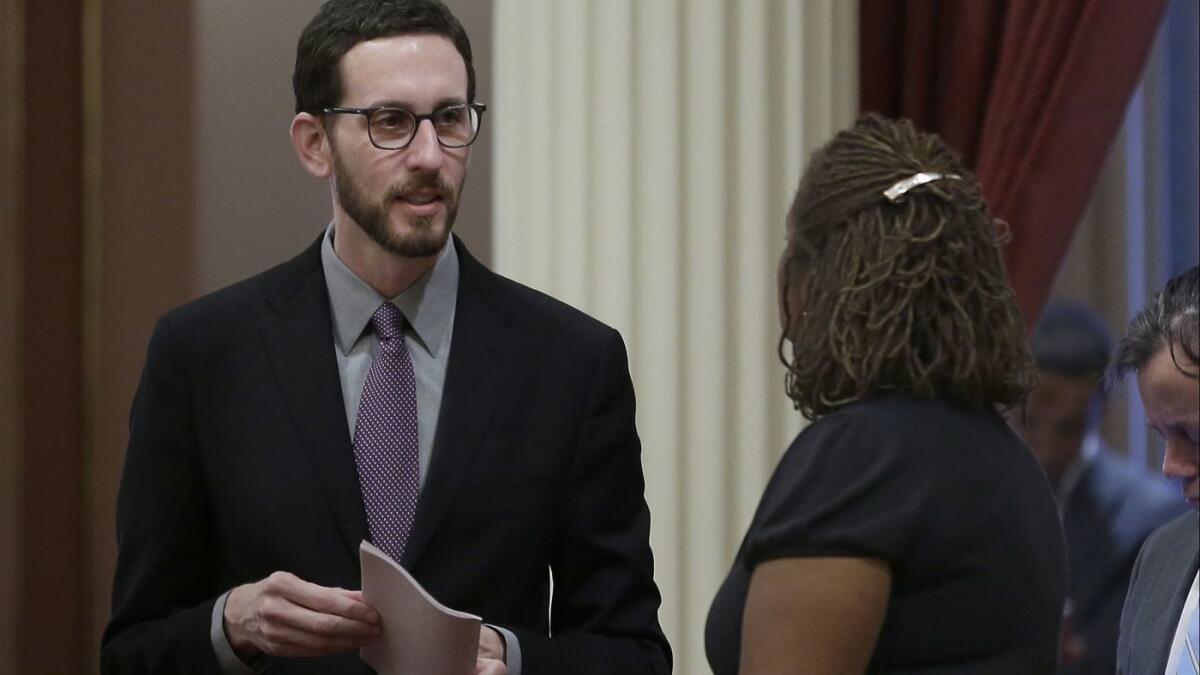Op-Ed: California is trying to pass a net neutrality bill — and broadband providers are trying to gut it

- Share via
Political divisions may be fierce, but there is at least one issue that most Americans agree on: net neutrality.
That’s the simple idea that internet service providers should not control or influence what we do online. Net neutrality rules ensure an equal playing field on the web for everyone, from the start-up to the tech giant.
According to a 2017 poll conducted by the University of Maryland, 83% of Americans opposed the dismantling of these rules by the Federal Communications Commission. Nevertheless, the FCC repealed the regulations in December. The changes took effect in June.
Following the rollback, the California legislature stepped in to reestablish net neutrality in our state. State Senate Bill 822 would restore all the core protections. It’s up for a vote in the state Assembly later this month.
Californians should contact their state legislators. The internet belongs to all of us, not big telecom.
Not surprisingly, big telecom companies are fighting hard against SB 822. They’ve enlisted an army of lobbyists and special interest groups to spread misinformation about the bill.
For instance, the companies are telling lawmakers that they won’t have the incentive or money to build out networks if they can’t prioritize internet traffic for businesses and consumers who pay extra fees.
That’s simply not true. Under the previous net neutrality rules, which banned such fees, telecom companies did better than fine. AT&T Mobile’s profit margin was nearly 50%. And Comcast was able to buy back more than $15 billion of its own stock over the last three years.
Telecom companies also are making dubious claims to defend certain strategies for favoring their own services and content over that of their competitors. It’s often done through a practice known as zero-rating, in which companies do not count the use of certain apps and content against a customer’s monthly data cap.
Although zero-rating is not always harmful, it can be in certain circumstances because it gives the companies control over which services users can afford to access. The practice is becoming increasingly problematic as telecom companies continue to blur the lines between service provider and content provider.
SB 822 would prohibit anti-competitive forms of zero-rating. The telecom companies do not like this, so they are claiming that zero-rating plans benefit low-income communities. They say the selective free data, paid for by sponsorships, is a consumer perk.
This is not true. People with low incomes are disproportionately dependent on smartphones for internet access, according to the Pew Research Center. As has been observed in other countries, when zero-rating schemes are banned, ISPs raise caps and lower the price of data for everyone. For many families, higher data caps make the difference between children being able to do their school homework or not.
Enter the Fray: First takes on the news of the minute from L.A. Times Opinion »
The telecom companies also are trying to claim that SB 822’s prohibition on certain kinds of zero-rating goes further than our previous net neutrality rules did. But the FCC itself reported in 2017 that these plans violated net neutrality.
Big ISPs appear to believe they can use money, muscle and misinformation to kill SB 822, just as they were able to repeal net neutrality protections.
That’s not going to work. The U.S. Senate already has passed a bipartisan measure to undo the FCC’s repeal. The fight is now in the House, where there is a bipartisan effort to force a vote on a companion to the Senate’s measure.
On so many issues, California leads the country. We can lead on net neutrality too by passing SB 822 without loopholes or amendments that weaken the bill.
Californians should contact their state legislators. The internet belongs to all of us, not big telecom. Now more than ever, we need open and equal access to the most democratic communications system ever invented.
Congressman Ro Khanna represents Silicon Valley as part of California’s 17th District.
Follow the Opinion section on Twitter @latimesopinion or Facebook
More to Read
A cure for the common opinion
Get thought-provoking perspectives with our weekly newsletter.
You may occasionally receive promotional content from the Los Angeles Times.









